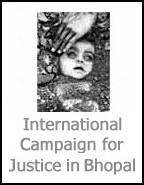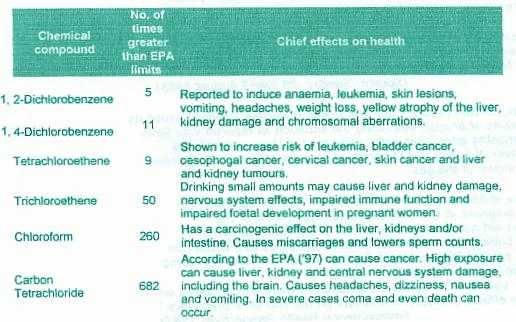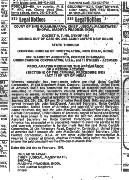Organize a Call-in Day! Set up a table in your campus crossroads and organize a mass call-in or fax-in to the Indian Embassy in Washington, DC. Ask for the Ambassador or a senior official, and tell them to comply with ICJB’s demands.
Comply with the May, 2004 order of the Indian Supreme Court and supply safe drinking water through Kolar Pipeline in communities affected by Union Carbide’s contamination. Talking Points: b) The whole affair reeks of yet another scam at the expense of the Bhopal victims. While the Government claims to be supplying 360,000 litres of water per day, itself a fraction of the need for 881,500 liters/day, the actual supply in February 2005 was a little over 125,000 litres per day - just 14% of the daily water requirement, according to data collected by the International Campaign for Justice in Bhopal.
c) Mercury, chlorobenzenes and naphthalene are some of the deadly chemicals that were found at dangerous levels in the groundwater. Nearly 20,000 people, including gas victims and people who moved into the area after the disaster, are currently drinking this water because the Madhya Pradesh Government has failed to provide them with clean water. Already, reports indicate that the contamination may be causing an increased incidence of abdominal pain, giddiness, anemia, growth retardation among children, birth defects and skin problems among the 20,000 people exposed to the poisoned water.
Set up a National Commission on Bhopal with the authority to design, fund and implement initiatives in medical, economic, social and environmental rehabilitation. Talking Points: b) Government relief and rehabilitation schemes have been a failure.
Official figures indicate that more than Rs. 400 crores (or US $90
million) have been spent since the December '84 Union Carbide disaster
in Bhopal. Despite this, the system of health care is plagued with
little or no applicable research or treatment guidelines, and the
lack of a system of registration means that the government health
care is often part of the problem. Gainful employment has only been
provided to less than 200 persons. And the living environment of
the survivors continues to deteriorate.
Take immediate steps to send an amended request for extradition of Warren Anderson and for extradition of the authorized representative of the Union Carbide Corporation. Talking Points: b) After Anderson ignored multiple summons to appear for trial, including one published in the Washington Post (January 1st, 1992), the Indian Government issued an arrest warrant, circulated through Interpol. Anderson then went into hiding.
c) In 2002, Anderson was discovered living a life of luxury in the Hamptons, an exclusive beach resort not far from New York. In May of 2003, the Indian Government requested his extradition, but the request was rejected in July of 2004 by the US Government. Anderson is still considered an “absconder” (fugitive from justice) by the Indian Government. If extradited and convicted of the deaths of 20,000 Bhopalis, Anderson faces ten years in prison. ..........• Handouts
and fact sheets about Bhopal
|
The international student campaign to hold Dow
accountable for Bhopal, and its other toxic legacies around the world.
For more information about the campaign, or for problems regarding this
website, contact Ryan
Bodanyi, the Coordinator of Students for Bhopal.
WE
ALL LIVE  IN
BHOPAL
IN
BHOPAL
"The year 2003 was a special year in the history of the campaign for justice in Bhopal. It was the year when student and youth supporters from at least 30 campuses in the US and India took action against Dow Chemical or in support of the demands of the Bhopal survivors. As we enter the 20th year of the unfolding Bhopal disaster, we can, with your support, convey to Dow Chemical that the fight for justice in Bhopal is getting stronger and will continue till justice is done. We look forward to your continued support and good wishes, and hope that our joint struggle will pave the way for a just world free of the abuse of corporate power."
Signed/ Rasheeda Bi, Champa Devi Shukla
Bhopal Gas Affected Women Stationery Employees Union
International Campaign for Justice in Bhopal
This is what the www.studentsforbhopal.org site looked like in early 2008. For more recent information, please visit www.bhopal.net.







